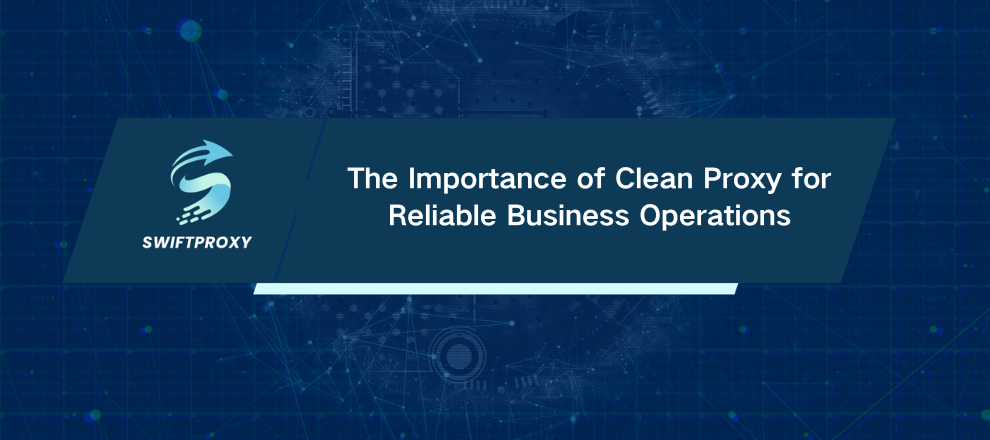The Importance of Clean Proxy for Reliable Business Operations

Proxies are tools for businesses looking to access or protect data, but their quality is not the same across the board. Selecting the right type—residential, datacenter, or mobile—is only the beginning. The real factor that makes a difference is clean IPs. Even the fastest residential proxy won't help if the IP itself has issues, as it can create major roadblocks for your project. This article explores what makes a proxy "clean" and why this detail is critical for the success of your operations.
Introduction to Clean Proxy
A clean proxy isn't just about speed or anonymity. Its past behavior matters—sometimes more than its type. Here's what you should look for:
1. No Flags on Major Anti-Abuse Systems
Clean proxies don't appear on global threat intelligence platforms like AbuseIPDB, Spamhaus, or Project Honey Pot. Once an IP is flagged, cloud providers, firewalls, and anti-bot systems downgrade or block it. Clean IPs slip through.
2. Trusted ASN Origins
Every IP belongs to an Autonomous System Number (ASN). Think of it as the "parent" network that controls the IP. Even if your IP is spotless, if it comes from an ASN with a shady history—spam, scraping, or abuse—some sites may flag it immediately.
3. Clear from Platform-Specific Blacklists
Major platforms—Google, Amazon, LinkedIn, TikTok—run private IP reputation systems. They silently monitor behavioral signals. A proxy might look fine on public databases but still be throttled, shadow-banned, or blocked internally. A truly clean proxy avoids these traps.
In short, a clean proxy is your ticket to reliable access. Dirty ones? They can tank your workflow, even if your code and rotation logic are perfect.
Key Features of Clean Proxies
Now let's get practical. What features make an IP genuinely clean, and how do you verify it?
High Reputation Score
Check public tools like Spamhaus or AbuseIPDB. But don't stop at one source—cross-check. For instance:
IP 71.142.255.70 has no issues across both platforms. Confidence: high.
IP 148.75.104.225 shows a minor listing on Spamhaus but is clean on AbuseIPDB. This warrants caution.
Ethical Sourcing
It is important to know the source of your IPs. Reliable providers are transparent, and each IP is linked to a user who has given consent.
Clean Usage History
Even if public tools indicate an IP is clean, it may still carry issues internally with platforms like Amazon or Google. Always combine quality proxies with intelligent operational practices such as rotation, retries, and backoff strategies.
Leak Protection
No IP is truly clean if it leaks your real address via WebRTC or DNS. Such leaks link your session to your real identity, which raises red flags.
Why Clean Proxies Matter for Enterprise Use Cases
Web Scraping
Machine learning-driven detection systems are everywhere. Dirty IPs trigger throttling, silent drops, and blocks, even if your scraping code is flawless. Clean proxies plus smart rotation tools like Scrapoxy.io make your scrapers behave like real users.
Ad Tracking and Brand Protection
Bad proxies give skewed results. Malvertisers can show fake content to bots, fooling your verification process. Clean proxies ensure your data reflects the real user experience.
Cybersecurity and Fraud Prevention
A flagged IP can distort security tests, serve decoy sites, or expose your team. Clean proxies ensure accurate testing, safe investigations, and operational integrity.
Compliance and Reputation Oversight
Regulations like GDPR and CCPA demand transparency. Using ethically sourced, clean proxies reduces legal exposure and safeguards your business reputation.
How Swiftproxy Guarantees Clean Proxy
Fully Owned Infrastructure: No guesswork or inherited abuse. Full traceability.
Real-Time Reputation Monitoring: Continuous scans catch risky IPs before they affect you.
Ethical, Compliant IPs: Residential and mobile IPs come from opt-in, GDPR-compliant programs.
Behavior-Aware Rotation: Sticky sessions, dynamic IP rotation, and geo-targeting keep your traffic under the radar.
Continuous Pool Refresh: Overused or flagged IPs are replaced automatically.
Conclusion
Clean proxies form the baseline for success. Make sure to review your provider to see if they are transparent and if their IPs are ethically sourced. Failing to do so can put your business at risk of compliance issues, unreliable traffic, and reputational damage. Choosing wisely will ensure your infrastructure performs reliably.

















































